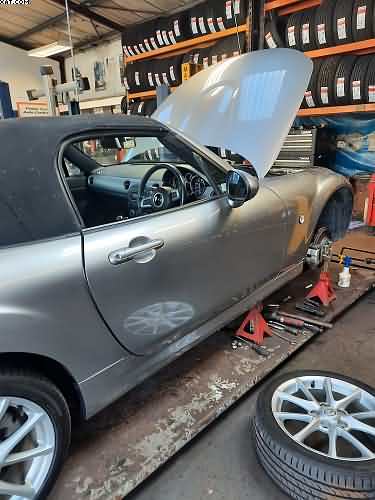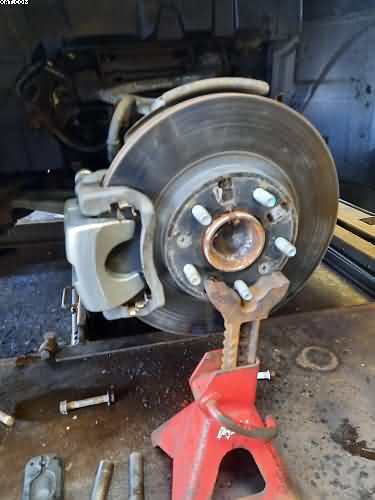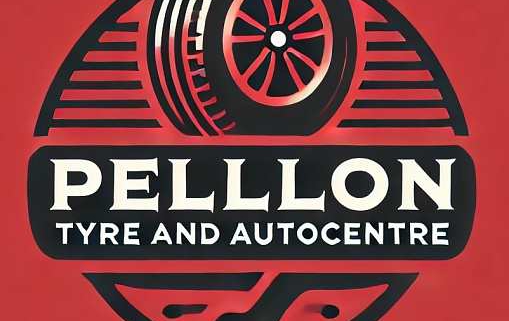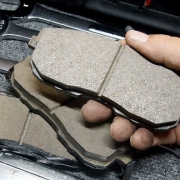Mazda Brake Calipers Badly Corroded
Table of Contents
Mazda Brake Calipers Badly Corroded

Mazda Brake Calipers Badly Corroded
Brake Binding Issues:
A Mazda’s Story of Callipers and Corrosion
This garage tale of mine, demonstrates the significance of regularly monitoring your car’s brakes. A customer complained about a problem with the brakes when they brought their Mazda into the garage the other day. They said that after a time of driving, they could smell something slightly burning and that the car felt slow, like it wasn’t coasting as it should. Not at all encouraging indications!
We quickly determined that the problem was a classic case of brake binding. Who’s at fault? brake callipers will rust. I’ll explain why it’s so crucial to pay attention to your brakes and why the unfortunate Mazda needed new callipers.
What Does Brake Binding Mean? Mazda Brake Calipers Badly Corroded
When you remove your foot off the brake pedal but your brakes don’t fully release, this is known as brake binding. This implies that even when you are not braking, the pads remain in contact with the disc and produce friction. That burning smell was coming from the friction, which may also produce excessive heat and make the car feel sluggish. It can do major harm to your entire braking system, not just your brakes, if ignored.
Why Did the Brakes on the Mazda Bind? Mazda Brake Calipers Badly Corroded
The corrosion in the brake callipers of this specific Mazda was the main source of the issue. When you depress the brake pedal, the calliper—a component of the braking system—pushes the brake pads against the disc. The pads stay in touch with the disc if the callipers seize up because they are unable to retract all the way, which is exactly what happened in this instance.
You may be wondering, “How does corrosion cause this?” at this point. The conditions in West Yorkshire are ideal for the emergence of brake issues such as these. More moisture exposure is a result of our wonderful British weather, particularly during the wetter months. You’ve got a recipe for rust and corrosion on all kinds of auto parts, including the brake callipers, when you add in the salt and grit that are thrown on the roadways throughout the winter.
Typical Reasons for Brake Binding

Brake binding can happen for a few different reasons, though the rust in this Mazda was the cause of the issue. Let’s examine a few of the primary offenders:
1. Failed or clogged callipers: As the Mazda demonstrated, callipers that corrode or seize will not retract correctly, allowing the pads to drag against the disc. This frequently happens as a result of ageing over time, exposure to water, and road salt.
2. Retained Brake Discs: Sometimes the brake pads themselves become trapped instead of the callipers. The pads may become stuck in contact with the disc as a result of rust, dirt, or debris obstructing their ability to move freely.
3. Brake Hoses That Collapsed: Brake hoses may deteriorate or internally disintegrate with time. This can leave the brakes partially pressed because the hydraulic pressure doesn’t release properly after braking.
4. Dangerous or Unclean Brake Discs: Your brake discs’ extreme wear or rust buildup may also be a factor in why the pads aren’t releasing easily. The pads may grip unevenly as a result of uneven discs.
How the Brake Issue on the Mazda Was Resolved- Mazda Brake Calipers Badly Corroded
We replaced the corroded callipers on the Mazda with new ones after determining the problem. To ensure that everything else in the brake system was in working order, we carefully cleaned and inspected everything. The car operated as it should once the callipers were changed, allowing the brakes to release smoothly. No more burnt smell, no more lethargy, and—above all—no more brake binding!
The Value of Continual Brake Inspections
This story serves as a reminder of how crucial it is to have your brakes inspected frequently, especially if you notice anything unusual. Since your car’s brakes are among its most important safety components, you can’t afford to ignore issues like binding.
The weather and road conditions in Halifax and around Yorkshire can be rather hard on cars, and it’s not just potholes that cause this. During the winter, road salt, moisture, and grime all contribute to the deterioration of brakes. For this reason, having your brakes inspected before and after the winter months is a smart idea to do at least twice a year.
Indications That Your Brake May Not Be Working Correctly-Mazda Brake Calipers Badly Corroded
Here are several indicators that your car may have brake binding if you’re concerned about it:
Car Seems sluggish: Brake binding may be the cause of your car’s inability to coast or sensation of being held back, even when you’re not applying the brakes.
Charging Aroma: This is a serious red flag that something is off. Your brakes may be overheated if you smell burning after driving, especially if it was a lengthy drive.
Overheating from the Wheels: If one wheel is hotter than the others after driving, it’s probably the brake on that wheel binding.
Grinding or Squeaking Noises: The sound of the brake pads rubbing against the disc when they shouldn’t be could be the source of strange sounds made while driving.
Concluding Remarks
Brakes are an important component that you cannot ignore. If the owner of this Mazda had not seen the early indicators of brake binding, the vehicle might have found itself in a much more dangerous situation. Thankfully, it’s back on the road and safe and sound after new callipers were installed.
Do not hesitate to stop by the garage (Pellon Tyres and Autocentre, Halifax, UK), if you see any of the indicators I’ve given or if your brakes need to be checked. We’ll make sure your brakes are in excellent shape so that you and other drivers on the road may drive safely, whether you drive a Mazda, Ford, or any other make. And believe me, once winter arrives, you’ll be glad you took preventative measures to avoid any potential brake problems!
- Mazda Brake Calipers Badly Corroded
- Sunbeam Rapier Cross Ply Tyres
- Vauxhall Corsa Bad Fuel Smell
- Ford Ranger Tyre Wire Showing
- Electric Cars More dangerous




